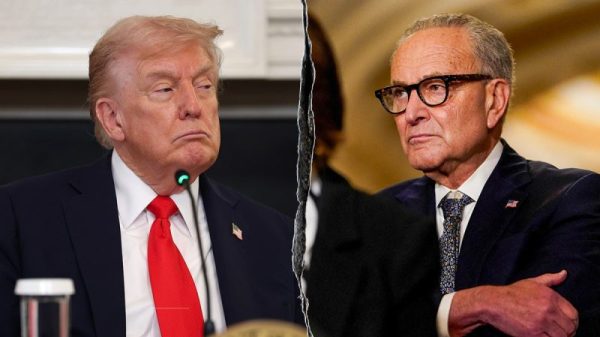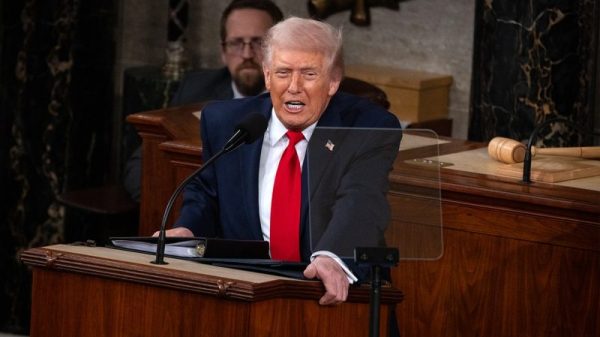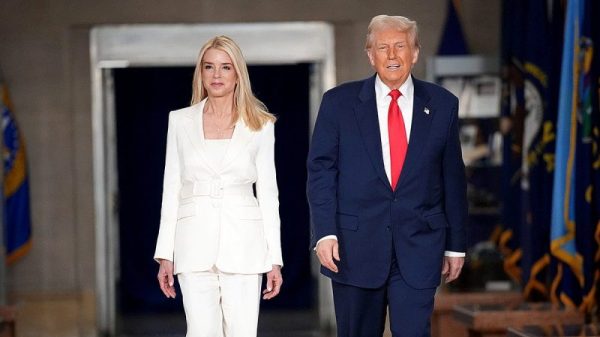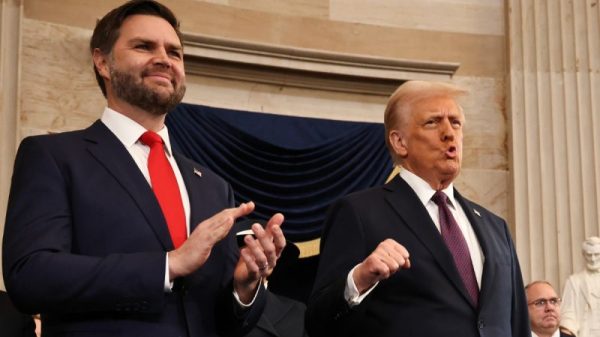In the 10 o’clock Eastern hour Thursday night, a realization began to set in among Democrats: They were witnessing an event that significantly imperils their hold on the White House, in President Biden’s poor and often incoherent debate performance. In the 10 o’clock hour Friday morning came a pair of Supreme Court decisions that compounded their misery.
It was a banner 12 hours for the American political right, the likes of which we’ve rarely seen in recent years.
But how good was it for them — and bad for the left?
To recap, Biden’s debate performance immediately led to significant fretting on the left about his ability to carry the torch forward, even leading some to float replacing him on the ballot at August’s Democratic National Convention. That was followed by the Supreme Court on Friday morning: 1) delivering a significant setback to the government’s prosecutions of Donald Trump allies over the Jan. 6 insurrection, and 2) delivering conservatives a long-awaited win overturning crucial four-decade-old precedent in the Chevron vs. Natural Resources Defense Council case.
The final event might actually be the most significant and long-lasting. The Supreme Court overturned a 1984 precedent that said courts should largely defer to federal agency officials in interpreting laws. That sounds technical and obscure, but the ruling could be massive. It could severely hamper the ability of the government to do things like combat climate change and regulate big business, shrinking the role of government and experts in American life.
The impact of the Jan. 6 decision is more nuanced, but it’s significant both practically and politically. Basically, the court ruled that the government used a federal law — obstructing or impeding an official proceeding — too broadly in charging a Jan. 6 defendant. That same law has been used against hundreds of other Jan. 6 defendants, including Trump himself.
The Justice Department quickly sought to downplay the ruling. It noted that 82 percent of more than 1,400 Jan. 6 defendants weren’t charged with or haven’t been convicted of that particular crime. It also noted that just 2 percent of those currently serving prison sentences were convicted of that crime and no other felony. The implication: This isn’t about to free a bunch of prisoners.
It could also have limited impact on Trump personally, given he’s charged with other Jan. 6-related offenses. But it’s still a massive headache with untold consequences.
Perhaps as significantly, though, it gave Trump rare, actual political ammunition in his years-long effort to downplay Jan. 6 and accuse the government of going too far in prosecuting him and his supporters.
Trump’s claims about the “weaponization” of the justice system and his proposal to pardon Jan. 6 defendants haven’t really caught on beyond his base. But it’s a decision he can use to make those cases, the former of which has largely rested on conspiracy theories and misleading claims. The Supreme Court effectively said the government has gone too far, at least in one case. And notably, the Supreme Court’s majority in the case included liberal Justice Ketanji Brown Jackson (though Jackson suggested the ruling shouldn’t spare too many Jan. 6 defendants from their charges).
That doesn’t mean Trump will be able to completely flip the script or anything close to it; these are complicated issues that won’t have much immediate fallout. But it’s certainly a foothold he didn’t have before.
The impact of Thursday night’s debate will come into focus more quickly as we get polling that gauges just how much damage Biden might have done to himself.
We’ve so far got limited data, including two snap polls showing about twice as many people said Trump won the debate as said Biden did. This includes CNN polling, which in 2020 had shown the opposite: Biden lapping Trump in those debates. The CNN poll also showed debate-watchers’ favorable views of Biden dropping by six points (to just 31 percent) and favorable views of Trump rising by three points (to 43 percent).
We’ll see what happens, but those are inauspicious early signs for a Democratic Party that had already been panicky about its 2024 chances. And the performance can’t help but drive home already-prevalent voter concerns about Biden’s age and mental sharpness; it was practically an hour-and-a-half-long advertisement for Republicans about what is arguably Biden’s biggest liability.
Should Biden’s polls indeed take a turn for the worse, it’s likely we’ll see an even more earnest discussion about turning the page on him. But that discussion itself would be fraught for the party.
Which means the blows could keep coming.
In the 10 o’clock Eastern hour Thursday night, a realization began to set in among Democrats: They were witnessing an event that significantly imperils their hold on the White House, in President Biden’s poor and often incoherent debate performance. In the 10 o’clock hour Friday morning came a pair of Supreme Court decisions that compounded their misery.
It was a banner 12 hours for the American political right, the likes of which we’ve rarely seen in recent years.
But how good was it for them — and bad for the left?
To recap, Biden’s debate performance immediately led to significant fretting on the left about his ability to carry the torch forward, even leading some to float replacing him on the ballot at August’s Democratic National Convention. That was followed by the Supreme Court on Friday morning: 1) delivering a significant setback to the government’s prosecutions of Donald Trump allies over the Jan. 6 insurrection, and 2) delivering conservatives a long-awaited win overturning crucial four-decade-old precedent in the Chevron vs. Natural Resources Defense Council case.
The final event might actually be the most significant and long-lasting. The Supreme Court overturned a 1984 precedent that said courts should largely defer to federal agency officials in interpreting laws. That sounds technical and obscure, but the ruling could be massive. It could severely hamper the ability of the government to do things like combat climate change and regulate big business, shrinking the role of government and experts in American life.
The impact of the Jan. 6 decision is more nuanced, but it’s significant both practically and politically. Basically, the court ruled that the government used a federal law — obstructing or impeding an official proceeding — too broadly in charging a Jan. 6 defendant. That same law has been used against hundreds of other Jan. 6 defendants, including Trump himself.
The Justice Department quickly sought to downplay the ruling. It noted that 82 percent of more than 1,400 Jan. 6 defendants weren’t charged with or haven’t been convicted of that particular crime. It also noted that just 2 percent of those currently serving prison sentences were convicted of that crime and no other felony. The implication: This isn’t about to free a bunch of prisoners.
It could also have limited impact on Trump personally, given he’s charged with other Jan. 6-related offenses. But it’s still a massive headache with untold consequences.
Perhaps as significantly, though, it gave Trump rare, actual political ammunition in his years-long effort to downplay Jan. 6 and accuse the government of going too far in prosecuting him and his supporters.
Trump’s claims about the “weaponization” of the justice system and his proposal to pardon Jan. 6 defendants haven’t really caught on beyond his base. But it’s a decision he can use to make those cases, the former of which has largely rested on conspiracy theories and misleading claims. The Supreme Court effectively said the government has gone too far, at least in one case. And notably, the Supreme Court’s majority in the case included liberal Justice Ketanji Brown Jackson (though Jackson suggested the ruling shouldn’t spare too many Jan. 6 defendants from their charges).
That doesn’t mean Trump will be able to completely flip the script or anything close to it; these are complicated issues that won’t have much immediate fallout. But it’s certainly a foothold he didn’t have before.
The impact of Thursday night’s debate will come into focus more quickly as we get polling that gauges just how much damage Biden might have done to himself.
We’ve so far got limited data, including two snap polls showing about twice as many people said Trump won the debate as said Biden did. This includes CNN polling, which in 2020 had shown the opposite: Biden lapping Trump in those debates. The CNN poll also showed debate-watchers’ favorable views of Biden dropping by six points (to just 31 percent) and favorable views of Trump rising by three points (to 43 percent).
We’ll see what happens, but those are inauspicious early signs for a Democratic Party that had already been panicky about its 2024 chances. And the performance can’t help but drive home already-prevalent voter concerns about Biden’s age and mental sharpness; it was practically an hour-and-a-half-long advertisement for Republicans about what is arguably Biden’s biggest liability.
Should Biden’s polls indeed take a turn for the worse, it’s likely we’ll see an even more earnest discussion about turning the page on him. But that discussion itself would be fraught for the party.
Which means the blows could keep coming.





















